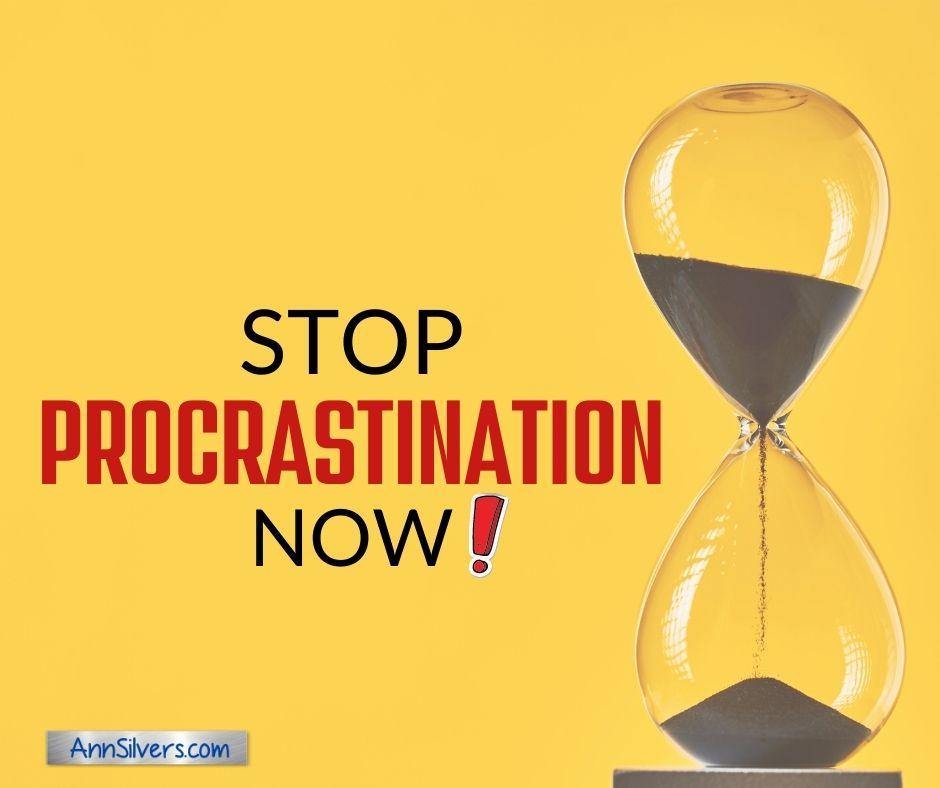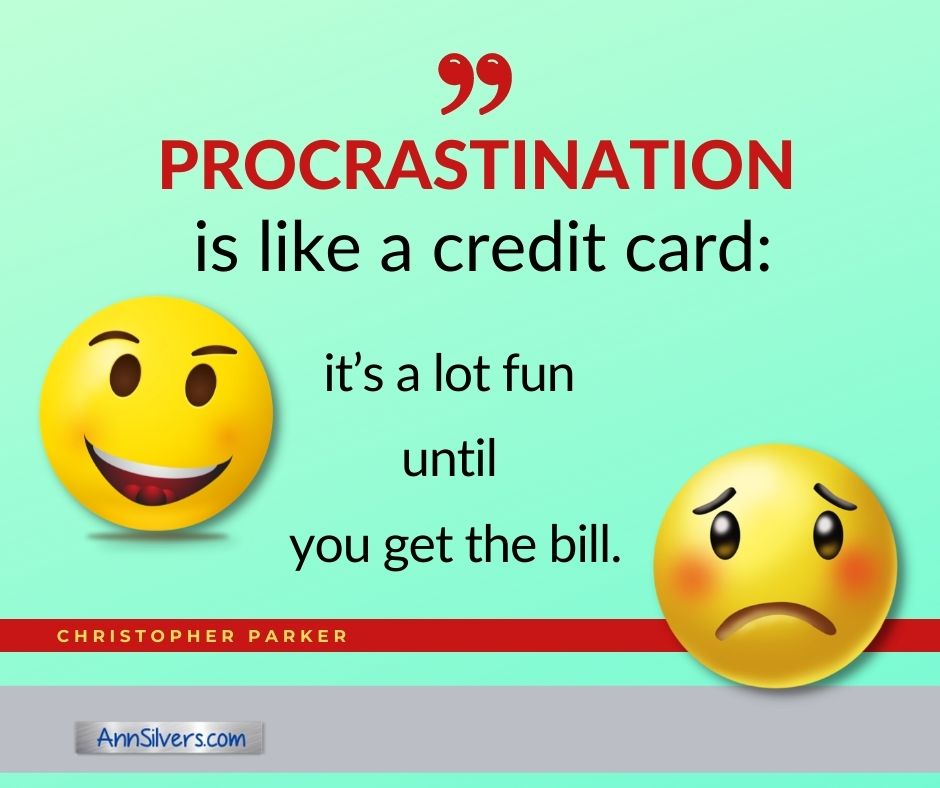Stop Procrastination Now! Causes, Fixes & Motivational Quotes

Do you keep putting things off — even when you know they need to get done? You’re not alone. Around 25% of people are chronic procrastinators, and nearly all of us do it sometimes.
This post explores the real reasons we procrastinate (hint: it’s not just laziness), the emotional and physical costs, and practical ways to break the cycle. You’ll also find motivational quotes and proven strategies to get things done — even when you don’t feel like it.
Procrastination Help: Causes, Effects, and What to Do Different
| What is Procrastination? Meaning and Definition |
| The Stats: How Many People Procrastinate? |
| Funny Procrastination Quotes That Capture the Irony — And the Struggle |
| Negative Effects of Procrastination: Costs to Your Health and Well-Being |
| The Procrastination-Anxiety Cycle: Avoidance and Stress |
| When Procrastination Triggers Anxiety |
| When Anxiety Fuels Procrastination |
| Why Do You Procrastinate? Common Causes |
| Inspiration: 20+ Motivational Quotes to Help You Stop Procrastinating |
| Get Stuff Done: 4 Practical Steps to Overcome Procrastination |
| Becoming Calm Workbook: Procrastination, Stress, and Anxiety Help |
What is Procrastination? Meaning and Definition

Procrastination is putting off tasks that would be better done sooner. The better might be that you or someone else would feel better if the tasks were done sooner, or it might be that the job would be done better, or that your life would be better in some way.
Some people procrastinate about some things, but not others. They may put off working on some deadlines and projects while they tackle other things in a more timely way.
Procrastination becomes a bigger and bigger problem when it is chronic (widespread and often).
Canadian professor Timothy Pychyl's definition of procrastination:
“You know what you ought to do and you’re not able to bring yourself to do it. It’s that gap between intention and action.”
Procrastination expert, Fuschia Sirois (UK), author of Procrastination: What It Is, Why It’s a Problem, and What You Can Do About It (2022), provides this meaning of procrastination:
"A common self-regulation problem involving the unnecessary and voluntary delay in the start or completion of important intended tasks despite the recognition that this delay may have negative consequences."
Sirois points out that procrastination is from the latin: of tomorrow.
Thoughtful Delay: Sometimes there are benefits to waiting to do things. You might delay because you’re gathering more information, developing skills, or waiting for conditions to change. That’s strategic and thoughtful. Procrastination is different. It’s not a calculated pause — it’s a self-defeating delay, even when you know that waiting may make things worse, not better.
The Stats: How Many People Procrastinate?
Procrastination is widespread.
Piers Steel breaks down the stats in his 2007 article, The Nature of Procrastination:
- 15-25% of adults are chronic procrastinators
- 80-90% of college students procrastinate sometimes
- 50% of college students procrastinate consistently
- 95% of procrastinators wish they could reduce it
Internet Procrastination: A 2001 survey posted online found that of the 300 responders, half of them reported they frequently used the internet to procrastinate, and that half of their online time was spent "cyberslacking."
Funny Procrastination Quotes That Capture the Irony — And the Struggle

“Procrastination is the art of keeping up with yesterday”― Don Marquis
“Never put off till tomorrow what may be done day after tomorrow just as well.” – Mark Twain
“Procrastinators unite… tomorrow!” – Anonymous
Sometimes humor opens our mind and softens resistance, making it easier to face what needs attention.
Negative Effects of Procrastination: Costs to Your Health and Well-Being
Procrastination gets in the way of getting things done. Besides reduced productivity, it has real emotional, mental, and physical consequences.
Over time, chronic procrastination can erode well-being in multiple areas.
Negative Academic and Professional Impact
Many studies have shown that procrastination results in lower grades. (2023)
People who procrastinate more tend to earn less, hold jobs for shorter periods, and are more likely to be unemployed or underemployed rather than working full-time. (2013)
Negative Mental and Physical Health Impact
A large-scale study of over 3000 Swedish university students followed for nine months found that procrastination led to increased:
-
- Stress and anxiety
- Depression
- Lonliness
- Sleep problems
- Physical inactivity
- Physical pain
Understanding the deeper reasons behind procrastination is the first step toward breaking free from its grip.
The Procrastination-Anxiety Cycle: Avoidance and Stress
Procrastination and anxiety often feed off each other, creating a frustrating loop that’s hard to break.
You put things off, which increases stress and anxiety.
That anxiety then drains your focus and motivation — making it even harder to get started. Recognizing this cycle is the first step to changing it.
Anxiety and procrastination are related in two ways:
-
Procrastination can create anxiety.
-
Anxiety can create procrastination.

When Procrastination Triggers Anxiety
It’s not hard to see that leaving things until the last minute, or until it’s actually too late to do a good job, or too late to get it done at all — can cause fear, stress, and anxiety.
The entire time between a deadline being set or a “to-do” being acknowledged and the accomplishment of the task may be stressful, or stress can appear and become more intense as the deadline approaches.
And the repercussions of not getting things done that needed to be done can create anxiety.
The symptoms chronic procrastinators exhibit are the symptoms of anxiety: their mind goes around with awfulized versions of bad outcomes, can’t sleep because their mind won’t shut down, leaving them feeling hopeless and overwhelmed.
When Anxiety Fuels Procrastination
Anxiety saps your energy and distracts your mind. That emotional and physical draining and mental distraction gets in the way of focusing on what needs to get done and systematically taking the steps to achieve goals and deadlines.
Anxiety also plays into procrastination in another, more direct way.
Research shows that some procrastinators are driven by fear of failure or fear of success.
Anxiety is heightened fear.
Fear of failure procrastinators worry what people will think of them when they have tried to accomplish the task, so they put off working on the task. If there isn’t enough time to complete the task, then they can tell others, and convince themselves, that the poor job done doesn’t reflect on their capability, just on the time for the task.
Fear of success procrastinators fear the repercussions of success — such as raising people’s expectations or becoming the center of attention, so they self-sabotage through procrastination.
Procrastinating about a particular “to-do” might also be based on other fears connected to trying to accomplish that goal.
You could put off booking a flight because you are afraid of flying, procrastinate about paying bills because you’re afraid you don’t have enough money to pay them all, or drag your feet on responding to an invitation because of social anxiety.
Why Do You Procrastinate? Common Causes
Impulsivity, task aversion, disorganization, and low motivation to achieve the task can all play a part in procrastination.
To understand how these repeatedly get in your way, it can be helpful to look at what's behind those roadblocks to success.
Which of these fit for you?
You may procrastinate because you:
-
Allow yourself to focus on more “fun” things at the expense of what needs to be done
-
Lack self-confidence
-
Fear failure
-
Fear success
-
Overestimate the amount of time left until tasks need to be completed
-
Underestimate the time required to complete tasks
-
Are stuck in procrastination habits
-
Are intimidated by the task
- Are rebelling against the task
-
Find the task unpleasant
-
Imagine the task will be less intimidating or more pleasant in the future (this could be true if something is genuinely going to change between now and then, but usually is magical thinking that backfires).
As you can see, procrastination isn’t just about laziness — it often stems from fears, habits, or thought patterns. Identifying and understanding your personal reasons can be very useful in breaking the cycle.
Inspiration: 20+ Motivational Quotes to Help You Stop Procrastinating
Now that you’ve explored the common reasons behind procrastination, these quotes offer insight and encouragement to get you going in the right direction. Whether you’re stuck because of fear, doubt, distraction, or overwhelm — these words of wisdom can help shift your mindset and boost your motivation.
Overcoming being distracted by more fun stuff
Sometimes, procrastination is about chasing short-term pleasure. Scrolling social media, playing a video game, or going to the bar can all feel easier and more enjoyable than the thing you need to do.
When fun activities come with guilt or the shadow of a looming unmet deadline, they lose their shine. Delayed gratification often leads to deeper satisfaction.
“Procrastination is like a credit card: it’s a lot fun until you get the bill.” —Christopher Parker

“You cannot escape the responsibility of tomorrow by evading it today.” ―Abraham Lincoln
“Delaying gratification is a process of scheduling the pain and pleasure of life in such a way as to enhance the pleasure by meeting and experiencing the pain first and getting it over with. It is the only decent way to live.” ─M. Scott Peck
Overcoming lack of self-confidence
When self-doubt creeps in, taking action can feel risky. You might wonder if you're good enough, smart enough, or capable enough — so you stall. The task becomes less about doing something and more about proving your worth. But confidence isn’t a prerequisite for action — it’s often the result of it.
“To do anything in this world worth doing, we must not stand back shivering and thinking of the cold and danger, but jump in and scramble through as well as we can.” ─ Syndey Smith
“Focused action beats brilliance” – Mark Sanborn
“It is not because things are difficult that we do not dare; it is because we do not dare that they are difficult.” —Seneca

Overcoming fear of failure
Fear of failure can stop even the most capable people in their tracks. You might ruminate on worse-than-worst-case scenarios, feel frozen by perfectionism, or worry about disappointing others. But failing to try is its own kind of failure — one that leaves you stuck in “what if” limbo. These quotes reframe failure as part of growth, not the end of it.
“The only difference between success and failure is the ability to take action.” ─Alexander Graham Bell
“So what do we do? Anything. Something. So long as we just don’t sit there. If we screw it up, start over. Try something else. If we wait until we’ve satisfied all the uncertainties, it may be too late.” ─Lee Iacocca

“It was my fear of failure that first kept me from attempting the master work. Now, I’m beginning what I could have started ten years ago. But I’m happy at least that I didn’t wait twenty years.” ─ Paulo Coelho
➡️ For step-by-step help for overcoming fear of failure, check out these downloadable PDF worksheets on my Etsy shop: Reframing Mistakes & Failure: CBT Coping Skills Workbook.
Overcoming fear of success
Success doesn’t always feel safe. For some, it brings pressure, visibility, and new expectations. You might fear outgrowing people, standing out, or being asked for more than you feel ready to give. So you get in your own way.
But holding yourself back doesn’t protect your peace; it just prevents your progress. You’re allowed to grow, shine, and handle good things as they come.
“Our deepest fear is not that we are inadequate. Our deepest fear is that we are powerful beyond measure. It is our light, not our darkness that most frightens us. We ask ourselves, Who am I to be brilliant, gorgeous, talented, and fabulous? Actually, who are you not to be? –Marianne Williamson
Overcoming habitual procrastination
Sometimes, procrastination is mostly about habit. If your default is to delay, you may find yourself with a routine of putting off until tomorrow what you should be doing today.
Like a well-worn path through the woods, your brain gets used to avoidance. But you can carve a new trail one small decision at a time.
"Procrastination is the thief of time." ─Charles Dickens
“Confront the difficult while it is still easy; accomplish the great tasks by a series of small acts.” –Tao Te Ching

“How different our lives are when we really know what is deeply important to us, and keeping that picture in mind, we manage ourselves each day to be and to do what really matters most.” —Stephen Covey
“The really happy people are those who have broken the chains of procrastination, those who find satisfaction in doing the job at hand. They’re full of eagerness, zest, productivity. You can be, too.” ─ Norman Vincent Peale
Overcoming finding the task intimidating
When something feels too big or unknown, we may avoid it. When a task feels big and scary, break it down into steps and take the smallest doable step.
“You don’t have to see the whole staircase, just take the first step.” ─ Martin Luther King, Jr.
“Nothing in the world can take the place of perseverance. Talent will not; nothing is more common than unsuccessful people with talent. Genius will not; unrewarded genius is almost legendary. Education will not; the world is full of educated derelicts. Perseverance and determination alone are omnipotent.” ─Calvin Coolidge
“The best way to get something done is to begin.” ─Author Unknown

Tackle unpleasant tasks now
We all have tasks we don't enjoy or dread. Ones that feel boring, gross, tedious, or emotionally draining. The temptation to delay is strong, but avoidance usually backfires. That quick escape turns into a slow burn of stress, guilt, or last-minute panic.
Getting it over with is often the kindest thing you can do for yourself.
“Don’t procrastinate. Putting off an unpleasant task until tomorrow simply gives you more time for your imagination to make a mountain out of a possible molehill. More time for anxiety to sap your self-confidence. Do it now, brother, do it now.” ─Author Unknown
“Putting off an easy thing makes it hard. Putting off a hard thing makes it impossible.” —George Claude Lorimer
"This is the perplexing thing about procrastination: although it seems to involve avoiding unpleasant tasks, indulging in it generally doesn't make people happy.” ─ James Surowiecki

Overcoming thinking it will feel better later
Sometimes it's true that you will be more efficient or effective at something in the near future. But if you have a pattern of procrastination, the waiting for the mood game isn't really about that. It's about creating an excuse for doing it "not now."
The wait becomes a stall, and the task grows heavier in your mind.
“I don’t wait for moods. You accomplish nothing if you do that. Your mind must know it has got to get down to work.” ─ Pearl S. Buck
“Amateurs sit and wait for inspiration, the rest of us just get up and go to work.” – Stephen King
Overcoming thinking conditions will be better later
Waiting for the perfect conditions can feel valuable, but nothing is ever perfect, and this approach is likely to turn into a pattern of endless delay.
Later is a moving target that never arrives.
“ If and When were planted, and Nothing grew.” ─ Turkish Proverb
“Procrastination makes easy things hard, hard things harder.” —Mason Cooley
“When there is a hill to climb, don’t think that waiting will make it smaller.” —Author Unknown

Get Stuff Done: 4 Practical Steps to Overcome Procrastination
To overcome procrastination, you need to stop and analyze what's going on.
Fuschia Sirois, professor and Editor in Chief of the British Journal of Health Psychology, points out that continually giving in to avoidance strategies gets in the way of addressing the repeating problem:
“If you’re focused just on trying to get yourself to feel good now, there’s a lot you can miss out on in terms of learning how to correct behavior and avoiding similar problems in the future.”
When you notice yourself wanting to procrastinate, or in the middle of procrastinating, stop. Take a couple of deep breaths. If you need to clear your head, do a quick grounding reset technique like those I list here. And work through the Get Stuff Done steps below.
Don’t put off working through this list step by step. :)

1. Analyze for what hurts and helps.
What could get in the way of you accomplishing this thing? What could help?
2. Break the task down into doable steps.
Keep breaking down the task until you get to a small, doable step. Set a time deadline for getting the step done.
3. Do a step.
If you are not getting around to doing the step, check to see if the task needs to be broken down further, and ask yourself the Step 1 questions.
4. Celebrate and repeat.
Give yourself a pat on the back for progress. (Yeah you!) Then tackle the next step.
➡️ If procrastination is tangled up with stress or overwhelm for you, my Becoming Calm workbook walks you through ways to get grounded, focused, and moving in the right direction.
Becoming Calm Workbook: Procrastination, Stress, and Anxiety Help
With anxiety being one of my counseling specialties, I noticed the connections between stress, anxiety, and procrastination a long time ago.
Not all people who have anxiety procrastinate, but many people who procrastinate have anxiety.
My Becoming Calm: Silver Lining Reduce Anxiety and Increase Stress Resilience Workbook and Journal includes worksheets to help you stop procrastinating and lots more anti-anxiety help.
Disclaimer: I'm not promising specific results from anything in this post or linked items. It is always advisable to seek the help of personal helping professionals.
- Ann Silvers








Comments 0